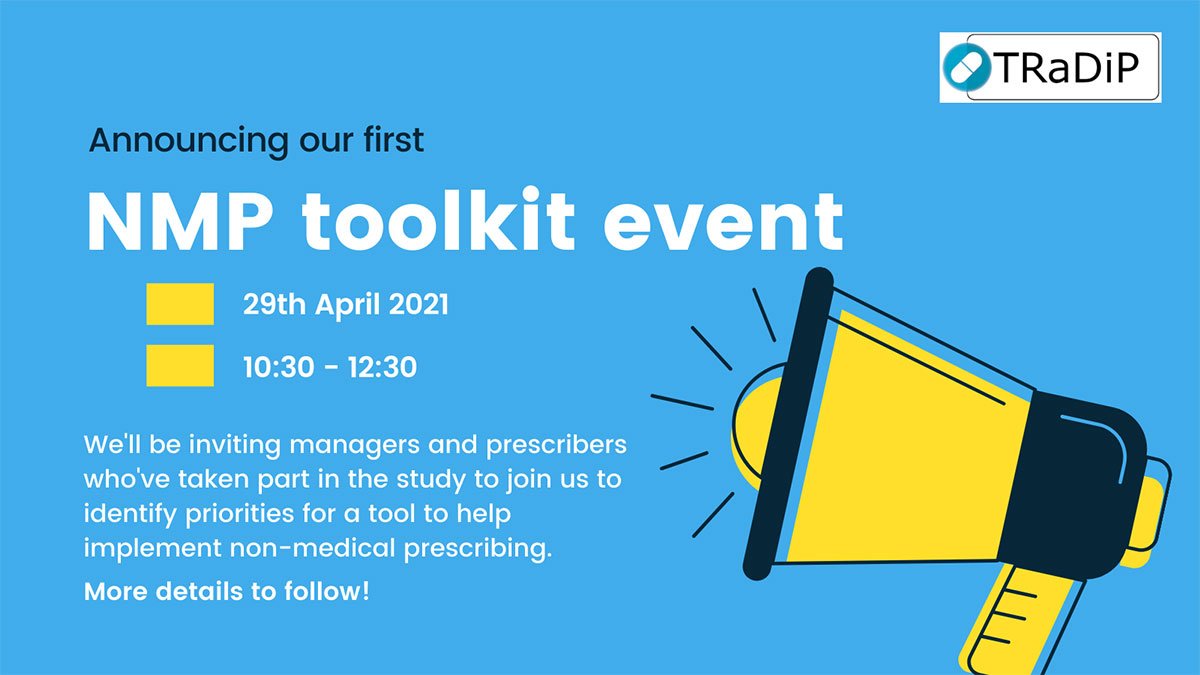
Evaluation of supplementary prescribing by dietitians and independent prescribing by radiographers
Start date
February 2019End date
March 2024Introduction
A recent change in the law allows dietitians and therapeutic radiographers, working at an advanced level, to prescribe medicine for patients that they treat. Before they can prescribe, dietitians and therapeutic radiographers must pass a prescribing training programme.
Dietitians, who manage diet and feeding for many health problems, can prescribe medicines from a treatment plan agreed with a doctor. This is known as ‘supplementary prescribing’. Therapeutic radiographers, who deliver radiotherapy and manage the side effects of this for people with cancer, can assess patients and prescribe medicine without the need of a doctor. This is known as known as ‘independent prescribing’. Research on prescribing by other professionals, such as nurses and pharmacists, shows benefits to patients and to the NHS. From talking to patients, we know that faster access to medicines is important and this change may be welcomed if patient safety is assured.
Aim
We aim to study the effect of dietitians and therapeutic radiographers prescribing on patients, staff and services. We will study how prescribing is used and identify where it works well, to help managers to plan services. The study will be conducted by an experienced research team, including a patient advisor, and will be guided by clinicians, managers and a patient group to advise when best to approach patients and help design tools and written information.
Plan of investigation
This study will be conducted in four phases:
Phase 1:
Will be a literature review, to understand the roles of advanced practice dietitians and therapeutic radiographers in medicines management and to assess the impact of their prescribing activities on patients and organisations.
Phase 2:
Will be a survey of the current therapeutic radiography and dietetic services provided in England and surveys of dietitian/therapeutic radiographer prescribers. The surveys will explore how and where dietitian and therapeutic radiographer prescribing is being put into action.
Phase 3:
Will consist of a comparative case study of four sites where dietitians or therapeutic radiographers are prescribing. At these sites we will compare the impact of these prescribers versus non-prescribing colleagues.
In addition, we will identify two sites where dietitians or therapeutic radiographers are about to begin prescribing training. In these cases, we will collect data before and after the training to look at the changes resulting from the qualification.
We will be collecting a range of information using prescriber self-reporting tools, patient questionnaires and phone interviews, and data collected for us by hospital staff on-site.This will include:
- Staff reports on their prescribing and patient-facing activities
- Patient satisfaction and views
- Economic data
- Patient safety data
Case studies will be from different hospital or community-based clinics around England. This data will be used to assess the impact of dietitian/therapeutic radiographer prescribing on patients, staff and services.
Phase 4:
Will be the development of a model of implementation and an online tool-kit.
Progress
Phase 1:
- We’ve completed the literature review and this is being prepared for publication.
Phase 2:
- We’ve completed data collection for this phase and are now analysing the data.
- We carried out 55 interviews with radiotherapy and dietetic service managers in England in our first round of interviews.
- We then spoke to 12 managers 12-18 months after their first interview, to see if anything had changed in their service.
- We received 103 completed surveys from dietitian and therapeutic radiographer prescribers in our first survey, and 34 of these completed our follow-up survey 12-18 months later.
Phase 3:
- We have completed data collection at all our case sites, 3 dietetics services and 4 radiotherapy services across England took part.
- We interviewed 32 staff members and 27 patients, and received 180 patient questionnaires.
- We also gathered information about prescriber and non-prescriber working practices, by collecting 513 self-reports from practitioners, and are assessing the safety of prescribing decisions.
Phase 4:
- Our prescribing toolkits are now hosted on the NHS Learning Hub (https://learninghub.nhs.uk/catalogue/prescribingtoolkit). The catalogue is accessible to researchers and healthcare workers and includes the preparing to prescribe toolkit. More resources will be added as they are developed.
We always welcome input from patients or carers using dietetic or therapeutic radiographer services. If you’d like to help with our work, please contact us on TRADIP@surrey.ac.uk.
Funder
This study is funded by the National Institute for Health and Care Research (NIHR) policy research programme (project reference PR-R19-0617-21001). The views expressed are those of the authors and not necessarily those of the NIHR or the Department of Health and Social Care.
Team
Principal investigator

Dr Nicola Carey
Head of Department for Nursing and Midwifery, University of the Islands and Highlands
See profileCo-applicants and research team

Dr Saeideh Babashahi
Research Fellow

Kate Bennet
Medical Statistician

Bill Davidson
Patient and Public Voice Expert Adviser

Judith Edwards
Postgraduate research student

Sarah Griffiths
Macmillan Consultant Radiographer- University Hospitals Bristol NHS Foundation Trust

Dr Kath Hart
Senior Lecturer in Nutrition and Dietetics

Dr Natalia Ivashikina
Senior Lecturer in Global Health Economics - University of Sussex

Dr Yogini Jani
Health Foundation Improvement Science Fellow, Consultant Pharmacist for Medication Safety, Director of the UCLH Centre for Medicines Optimisation Research and Education - University College London Hospitals NHS Foundation Trust

Dr Karen Shaw
Project Manager

Sam Sherrington
NHS Trafford CCG/Independent Consultant

Professor Simon Skene
Emeritus Professor of Medical Statistics

Dr Karen Stenner
Lecturer in Health Services Research
News
Newsletters
Non-medical prescribing toolkit event
Our first NMP toolkit event was held on 29 April.

We'll be inviting managers and prescribers who've taken part in the study to join us to identify priorities for a tool to help implement non-medical prescribing. More details to follow.
Stay connected
Latest tweets
@TRaDiPstudy



Outputs
TRADIP Dissemination Event
Report and summary
Patient prescribing leaflets
We’ve created a who’s who guide to prescribing to inform patients and carers about which healthcare professions could prescribe medicine. This was developed with healthcare professionals, patients and carers and is also available as part of the toolkit on the NHS e-learning hub.
- Who’s Who Guide to Prescribing: A guide for patients and carers (PDF)
- Who’s Who Guide to Prescribing: A guide for patients and carers - large print (PDF)
Research information sheets
Participant information sheets for the study are available here.
Manager interviews and prescriber surveys:
- Dietitian Participant Participant Information Sheet (PDF)
- Dietitian Therapeutic Radiographer Manager Participant Information Sheet (PDF)
- Therapeutic Radiographer Participant Information Sheet (PDF)
Case sites:
Research dissemination
As we make progress with the project, we will make our findings available through publications and a number of events. The details of these will be listed on here.
We presented some of our preliminary findings at the Health Services Research Conference in Sheffield in July 2022. Links to our presentations are below:
Research team articles
Judith Edwards, Melaine Coward, Nicola Carey (2022) Barriers and facilitators to implementation of non-medical independent prescribing in primary care in the UK: a qualitative systematic review BMJ Open
Jarmain Sally and Carey Nicola (2020) Exploring the roles and responsibilities of Non-Medical Prescribing leads in the South West of England Journal of Prescribing Practice.
Edwards Judith, Coward Melaine and Carey Nicola (2020) Paramedic independent prescribing in primary care – seven steps to success Journal of Prescribing Practice.
Nicola Carey, Judith Edwards, Simon Otter, Heather Gage, Peter Williams, Molly Courtenay, Ann Moore, Karen Stenner (2020)A comparative case study of prescribing and non-prescribing physiotherapists and podiatrists, BMC Health Services Research
Stenner Karen, Edwards Jude, Mold Freda, Otter Simon, Courtenay Molly, Moore Ann, Carey Nicola (2018) ‘Medicines management activity with physiotherapy and podiatry: A systematic mixed studies review.’, Health Policy 122 (12) pp. 1333-1339 doi: 10.1016/j.healthpol.2018.10.004
Courtenay M, Carey N, Gage H, Stenner K, Williams P (2015) ‘A comparison of prescribing and non-prescribing nurses in the management of people with diabetes’, JOURNAL OF ADVANCED NURSING 71 (12) pp. 2950-2964 doi: 10.1111/jan.12757
Carey N, Stenner K, Courtenay M. (2014) 'An exploration of how nurse prescribing is being used for patients with respiratory conditions across the east of England.'. BMC Health Serv Res, England: 14 (1) doi: 10.1186/1472-6963-14-27
Research themes
Find out more about our research at Surrey:

